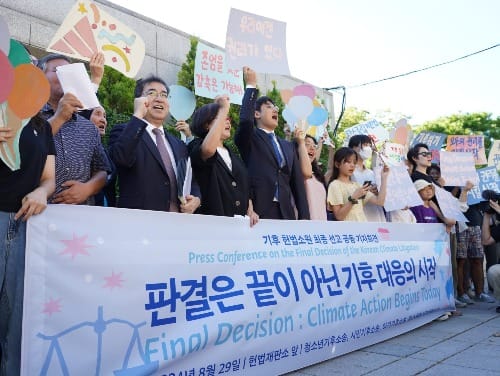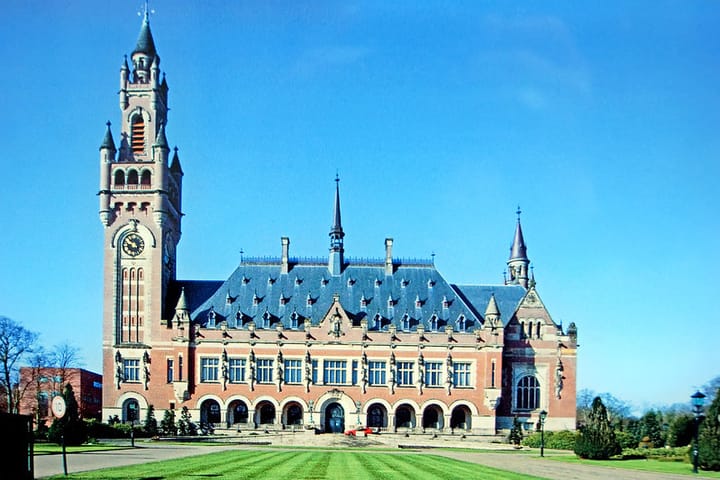South Korean Government’s Lack Of Long-Term Climate Targets Violates Constitution, Court Rules

In a first of its kind ruling in Asia, the Constitutional Court of Korea has decided that South Korea’s failure to set greenhouse gas emissions reduction targets beyond 2030 violates the country’s constitution. The ruling is a victory for Korean youth and other plaintiffs who challenged the adequacy of the government’s climate policies, and sets an important precedent for other rights-based climate cases in the region, climate lawyers and advocates say.
The Court’s August 29 decision found part of the government’s carbon neutrality law to be unconstitutional. Article 8, Section 1 of the Carbon Neutrality Framework Act does not specify emissions reduction targets from 2031 through 2049. This fails to “effectively guarantee gradual and continuous reductions up to 2050, the target year for carbon neutrality,” according to the Court, which means that emissions reductions “are governed in a way that shifts an excessive burden to the future.”
That part of the law provides insufficient protection for youth and future generations, the court determined. The government has until February 28, 2026 to amend the law with longer-term targets that conform to the constitution.
The Court did not uphold other claims the plaintiffs made challenging the government’s climate policies, including a challenge to the 2030 emissions reduction target of 40 percent below 2018 levels.
The judgment applies to four cases brought against the government in the last four years by youth climate activists, children and infants including a fetus, members of civil society and political party leaders as well as ordinary citizens, and South Korean nationals. The four cases were consolidated and hearings were held in April and May of this year.
“A Powerful Precedent”
“The Constitutional Court of Korea has set a powerful precedent by granting young people access to justice and recognizing their constitutional climate rights. This declaration of youths’ rights and the government’s wrongs is a testament to the leadership of youth plaintiffs and their relentless advocacy for a safe and livable future, and of another judiciary doing its job,” Julia Olson, co-executive director and chief legal counsel at Our Children’s Trust, said in a statement responding to the ruling.
Our Children’s Trust represents youth in constitutional climate lawsuits and has supported the Korean youth plaintiffs including by consulting with their legal team on the best available science to use as evidence. The first climate lawsuit filed against the South Korean government was brought in 2020 by youth activists with a group called Youth 4 Climate Action. According to Our Children’s Trust, the youth worked with lawyers from Seoul National University School of Law and an organization called Solutions for Our Climate to develop their case, which was inspired by the landmark American constitutional climate case Juliana v. US. The Juliana case, initially filed in 2015, was shut down by an appeals court panel earlier this year.
“For nearly a decade, the Juliana plaintiffs have fought to have their case heard at trial and their rights protected,” Olson said. “For a decade, dozens of youth cases inspired by Juliana globally have been heard and decided on the merits. Youth are crying out and courts around the world are listening. It’s time for U.S. courts to catch up.”
The Climate Litigation Network, a project of the Urgenda Foundation which won a historic climate lawsuit against the Dutch government, said in a LinkedIn post that the Korean Court’s decision “could inform a number of judicial decisions in the immediate future as well as inspire future legal claims,” noting pending youth climate cases in countries like Sweden and Indonesia. This “is the strongest judgment in the world outside of Europe and is sure to have ripple effects throughout Asia and beyond,” said Denis van Berkel, lead counsel for the Urgenda Foundation.
According to a statement on the ruling from Solutions for Our Climate, “lawsuits in Asia will now be influenced by this ruling, which sets a precedent for climate lawsuits in the region.” Earlier this year, a group of 13 people in Taiwan, supported by the Environmental Rights Foundation, brought a constitutional climate case challenging Taiwan’s short - and medium-term emissions reduction goals. And in August, sixteen young people from across Japan filed a climate case against thermal power companies demanding they adopt more stringent decarbonization plans.


